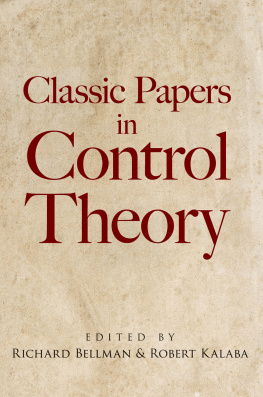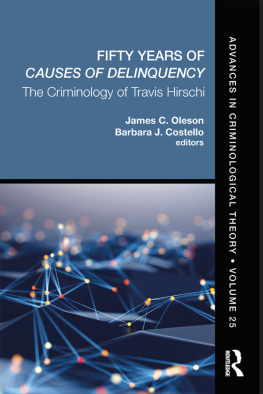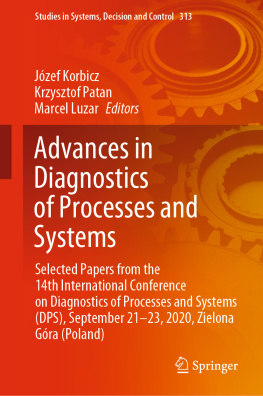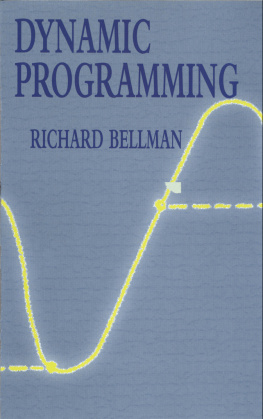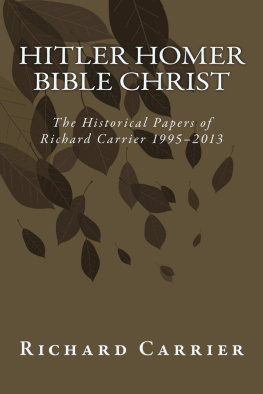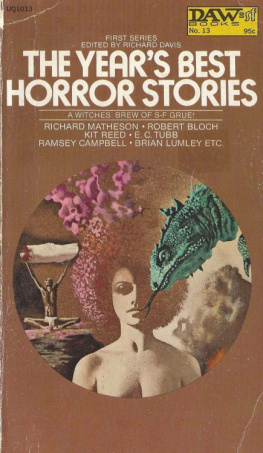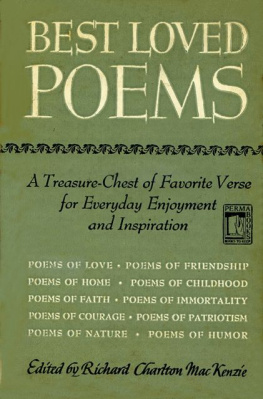Richard Bellman (editor) - Classic papers in control theory
Here you can read online Richard Bellman (editor) - Classic papers in control theory full text of the book (entire story) in english for free. Download pdf and epub, get meaning, cover and reviews about this ebook. year: 2017, genre: Romance novel. Description of the work, (preface) as well as reviews are available. Best literature library LitArk.com created for fans of good reading and offers a wide selection of genres:
Romance novel
Science fiction
Adventure
Detective
Science
History
Home and family
Prose
Art
Politics
Computer
Non-fiction
Religion
Business
Children
Humor
Choose a favorite category and find really read worthwhile books. Enjoy immersion in the world of imagination, feel the emotions of the characters or learn something new for yourself, make an fascinating discovery.
- Book:Classic papers in control theory
- Author:
- Genre:
- Year:2017
- Rating:5 / 5
- Favourites:Add to favourites
- Your mark:
- 100
- 1
- 2
- 3
- 4
- 5
Classic papers in control theory: summary, description and annotation
We offer to read an annotation, description, summary or preface (depends on what the author of the book "Classic papers in control theory" wrote himself). If you haven't found the necessary information about the book — write in the comments, we will try to find it.
Classic papers in control theory — read online for free the complete book (whole text) full work
Below is the text of the book, divided by pages. System saving the place of the last page read, allows you to conveniently read the book "Classic papers in control theory" online for free, without having to search again every time where you left off. Put a bookmark, and you can go to the page where you finished reading at any time.
Font size:
Interval:
Bookmark:
in
Control Theory
EDITED BY
Richard Bellman & Robert Kalaba
Dover Publications, Inc.
Mineola, New York
Copyright
Copyright 1964, 1992 by Dover Publications, Inc.
All rights reserved.
Bibliographical Note
This Dover edition, first published in 2017, is a new selection of papers, published for the first time in collected form. The editors and publisher are grateful to the authors and original publishers for permission to reproduce these papers, and to the Directors of the Columbia University Library for assistance in obtaining copies of the articles for reproduction purposes. The present edition was previously published by Dover in 1964 under the title Selected Papers on Mathematical Trends in Control Theory.
Library of Congress Cataloging-in-Publication Data
Names: Bellman, Richard, 19201984, editor. | Kalaba, Robert E., editor.
Title: Classic papers in control theory / edited by Richard Bellman and Robert Kalaba.
Other titles: Selected papers on mathematical trends in control theory
Description: Mineola, New York: Dover Publications, Inc., [2017] | Reprint of: Selected papers on mathematical trends in control theory / edited by Richard Bellman and Robert Kalaba, [1964]
Identifiers: LCCN 2017022367| ISBN 9780486818566 (paperback) | ISBN 048681856X (paperback)
Subjects: LCSH: Control theory. | BISAC: TECHNOLOGY & ENGINEERING / Electrical.
Classification: LCC QA402.3 .B4 2017 | DDC 629.8/312dc23
LC record available at https://lccn.loc.gov/2017022367
Manufactured in the United States by LSC Communications
81856X01 2017
www.doverpublications.com
Proceedings of the Royal Society of London, Vol. 16, 1868, pp. 270283.
Bulletin of the American Mathematical Society, Vol. 51, 1945,pp. 601646.
Mathematische Annalen, Vol. 46, 1895, pp. 273284.
Bell System Technical Journal, Vol. 11, 1932, pp. 126147.
Proceedings of the Symposium on Active Networks and Feedback Systems, Polytechnic Institute of Brooklyn, 1960.
The London, Edinburgh and Dublin Philosophical Magazine and Journal of Science, Vol. 3, 1927, pp. 6580.
Journal of Applied Mechanics, Vol. 9, 1942, pp. 6571.
Journal of Applied Physics, Vol. 21, 1950, pp. 645665.
Proceedings of the National Academy of Sciences, Vol. 45, 1959, pp. 573577.
Reports of the Academy of Sciences of the USSR, Vol. 110, No. 1, 1956, pp. 710.
Proceedings of the Symposium on Nonlinear Circuit Analysis, Polytechnic Institute of Brooklyn, 1956, pp. 199213.
IRE Transactions on Automatic Control, Vol. AC-5, 1960, pp. 510.
MAN HAS two principal objectives in the scientific study of his environment: he wants to understand and to control. The two goals reinforce each other, since deeper understanding permits firmer control, and, on the other hand, systematic application of scientific theories inevitably generates new problems which require further investigation, and so on.
It might be assumed that a fine-grained descriptive theory of terrestrial phenomena would be required before an adequate theory of control could be constructed. In actuality, this is not the case, and, indeed, circumstances themselves force us into situations where we must exert regulatory and corrective influences without complete knowledge of basic causes and effects. In connection with the design of experiments, space travel, economics, and the study of cancer, we encounter processes which are not fully understood. Yet design and control decisions are required.
It is easy to see that in the treatment of complex processes, attempts at complete understanding at a basic level may consume so much time and so large a quantity of resources as to impede us in more immediate goals of control.
The mathematical aspects are intriguing. First of all, there are fairly straightforward questions involved in determining optimal control in the presence of complete knowledge of the properties of the underlying physical system. Secondly, there are the more difficult and recondite questions of determining the extent of control that can be exerted, granted only certain pieces of information.
This challenge to the mathematician offered by modern control theory opens new vistas to those who will look, a veritable wilderness of problems for the pioneer, all quite different from the well-plowed classical fields. Nevertheless, the powerful and elegant tools forged in nineteenth-century workshops form the bases for many of the most effective conceptual, analytic, and computational procedures we possess.
The actual history of the mathematical theory is interesting. From Maxwell and Vyshnegradskii to the beginning of World War II, the basic tool was the differential equation, primarily in linear form, with no stochastic overtones. During the war, linear theory and quadratic criteria were still popular since they permitted extensive use of transform techniques and complex variable methods, but due to the efforts of Kolmogorov and Wiener stochastic processes were introduced. From 1945, through the research of the Russian school, Lure, Letov, Pontryagin, and others, and the American school, Booton, Dreyfus, LaSalle, Lefschetz, Minorsky, Kac and Siegert, the editors, and others, nonlinear equations and nonlinear stochastic processes became familiar to the control engineer.
Perhaps the most important mathematical development is this shotgun wedding of the classical optimization theory and the classical theory of stochastic processes. The resulting amalgam has already made significant contributions across the scientific board: biology, economics, engineering, psychology.
In the collection of papers offered here we have attempted to follow some natural and logical lines of development from the feedback concept first emphasized by Maxwell and Vyshnegradskii to current work in adaptive control processes. In any such collection it is impossible to present all significant contributions or even to mention a number of fundamental ideas. The papers that have been chosen are in the main connected with aspects of control theory to which we ourselves have been attracted, and are thus able to assess in some degree. The field is one of remarkable proliferation of problems and ideas, as the reader pursuing the references will soon observe.
Starting with feedback control processes involving small deviations from equilibrium, one is led to linear equations and thus to stability problems for linear equations with constant coefficients. A more realistic appraisal leads to nonlinear equations and the theory of Poincar and Lyapunov. It is then quite natural, yielding to the pressure of practice, to consider, following Minorsky, time lags and thus differential-difference equations. As a prelude to the modern approach which takes account of stochastic phenomena, we turn to linear prediction theory, as envisaged by Kolmogorov and Wiener. Following this, we enter the area of contemporary theory, bang-bang control theory in the general format of LaSalle, Gamkrelidze, and others, the Pontryagin maximum principle, and dynamic programming, applied to stochastic and adaptive control.
It will be clear upon reading these papers that control theory is a vital and growing field with enormous promise. Our hope is that this collection of papers will aid young engineers and mathematicians to obtain the overall perspective that is essential for successful research, and thus to help them embark upon their own programs.
It is a great pleasure to acknowledge the many helpful comments and constructive criticism of three old and cherished friends who have themselves contributed so much to control theory, J. P. LaSalle, S. Lefschetz, and N. Minorsky.
Font size:
Interval:
Bookmark:
Similar books «Classic papers in control theory»
Look at similar books to Classic papers in control theory. We have selected literature similar in name and meaning in the hope of providing readers with more options to find new, interesting, not yet read works.
Discussion, reviews of the book Classic papers in control theory and just readers' own opinions. Leave your comments, write what you think about the work, its meaning or the main characters. Specify what exactly you liked and what you didn't like, and why you think so.

